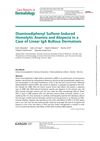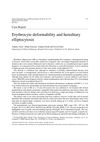 6 citations,
February 1974 in “The BMJ”
6 citations,
February 1974 in “The BMJ” The document concludes that scalp disorders can be treated with hair washing, specific shampoos, medications, and sometimes surgery or hair transplants, but hereditary baldness is untreatable.
 4 citations,
June 2016 in “Rossiiskii Zhurnal Kozhnykh i Venericheskikh Boleznei”
4 citations,
June 2016 in “Rossiiskii Zhurnal Kozhnykh i Venericheskikh Boleznei” Combining iron supplements with Qilib lotion is more effective for treating hair loss from iron deficiency.
 163 citations,
November 2003 in “Journal of Investigative Dermatology”
163 citations,
November 2003 in “Journal of Investigative Dermatology” Low iron levels may be linked to some types of hair loss in women.
 December 2020 in “Vestnik dermatologii i venerologii”
December 2020 in “Vestnik dermatologii i venerologii” Iron supplements and physiotherapy together can better treat hair loss in women with iron deficiency.
14 citations,
January 2020 in “Women's health reports” Iron deficiency in menstruating women causes many health issues beyond anemia and needs early detection and treatment.
 3 citations,
December 2001 in “Irish Journal of Psychological Medicine”
3 citations,
December 2001 in “Irish Journal of Psychological Medicine” Trichotillomania is a challenging-to-treat impulse-control disorder where individuals pull out their hair, more common in females, with some treatments showing benefits.
 8 citations,
February 2007 in “Journal of The American Academy of Dermatology”
8 citations,
February 2007 in “Journal of The American Academy of Dermatology” Higher serum ferritin levels than currently used might be needed to rule out iron deficiency in women with hair loss.
 July 2021 in “Clinical Medicine”
July 2021 in “Clinical Medicine” Iron deficiency without anemia can cause itching and other skin-related symptoms, and iron supplements may help.
15 citations,
January 2012 in “International journal of trichology” The HairCheck® device is effective for measuring hair loss and growth in people with alopecia.
 37 citations,
January 1997 in “Clinics in Dermatology”
37 citations,
January 1997 in “Clinics in Dermatology” Hair problems are common and distressing for women, but increasing knowledge of treatments offers hope.
 2 citations,
January 2012 in “Hair therapy & transplantation”
2 citations,
January 2012 in “Hair therapy & transplantation” Low serum ferritin levels are not closely linked to telogen effluvium in women.
 November 2018 in “Springer eBooks”
November 2018 in “Springer eBooks” Children need early diagnosis and treatment for iron-deficiency anemia to prevent learning problems and promote health.
 2 citations,
July 2015 in “Case Reports in Dermatology”
2 citations,
July 2015 in “Case Reports in Dermatology” DDS treatment for LABD can cause severe side effects like anemia and hair loss, requiring careful monitoring.
180 citations,
October 2019 in “British journal of haematology” Early detection and treatment of iron deficiency in pregnancy are crucial for maternal and infant health.
 January 2024 in “Polski Merkuriusz Lekarski”
January 2024 in “Polski Merkuriusz Lekarski” Pica disorder in central Iraq is mainly found in females and is linked to low iron levels; treatment with iron improves most patients.
 83 citations,
November 2002 in “British Journal of Dermatology”
83 citations,
November 2002 in “British Journal of Dermatology” Low iron levels are not directly linked to chronic hair loss and iron supplements may not help.
 6 citations,
January 2014 in “Clinical hemorheology and microcirculation”
6 citations,
January 2014 in “Clinical hemorheology and microcirculation” Hereditary elliptocytosis causes elongated red blood cells and can lead to mild or no symptoms.
 22 citations,
April 2006 in “Journal of The American Academy of Dermatology”
22 citations,
April 2006 in “Journal of The American Academy of Dermatology” More research is needed to determine if iron deficiency causes hair loss.
 207 citations,
April 2006 in “Journal of The American Academy of Dermatology”
207 citations,
April 2006 in “Journal of The American Academy of Dermatology” Iron deficiency may be related to hair loss, but there's not enough evidence to recommend iron screening or supplements for all hair loss patients.
 138 citations,
November 2015 in “Journal of Pharmacology and Experimental Therapeutics”
138 citations,
November 2015 in “Journal of Pharmacology and Experimental Therapeutics” Protoporphyrin IX is useful in cancer treatment but can cause health problems if not properly regulated.
 9 citations,
November 2003 in “Journal of Investigative Dermatology”
9 citations,
November 2003 in “Journal of Investigative Dermatology” Low serum ferritin levels are linked to hair loss in women.
 January 2018 in “International journal of food and nutrition research”
January 2018 in “International journal of food and nutrition research” Intermittent iron and nutritional supplements can help reduce hair loss.
 239 citations,
July 2002 in “Clinical and Experimental Dermatology”
239 citations,
July 2002 in “Clinical and Experimental Dermatology” Low iron and L-lysine levels can cause hair loss in women, and increasing these nutrients can reduce hair shedding.
 3 citations,
January 2017 in “Indian journal of health sciences and biomedical research KLEU”
3 citations,
January 2017 in “Indian journal of health sciences and biomedical research KLEU” Low iron levels are significantly linked to hair loss in women.
 April 2003 in “Journal of Cutaneous Medicine and Surgery”
April 2003 in “Journal of Cutaneous Medicine and Surgery” Some treatments work better for different types of hair loss, and nutrients like iron and L-lysine are important for preventing hair loss.
 1 citations,
August 2023 in “Cutis”
1 citations,
August 2023 in “Cutis” Low ferritin levels can indicate iron deficiency as a cause of hair loss.

Iron deficiency anemia can cause itching, which often improves with iron supplements.
 30 citations,
October 2010 in “Journal of The American Academy of Dermatology”
30 citations,
October 2010 in “Journal of The American Academy of Dermatology” The conclusion suggests a possible link between iron levels and hair health in women, recommending further research on iron supplementation for hair loss.
 3 citations,
February 2013 in “Bangladesh Journal of Medicine”
3 citations,
February 2013 in “Bangladesh Journal of Medicine” Low iron levels are linked to hair loss in women.
 62 citations,
January 2013 in “Skin Pharmacology and Physiology”
62 citations,
January 2013 in “Skin Pharmacology and Physiology” Low iron and vitamin D levels are linked to hair loss in women.


























